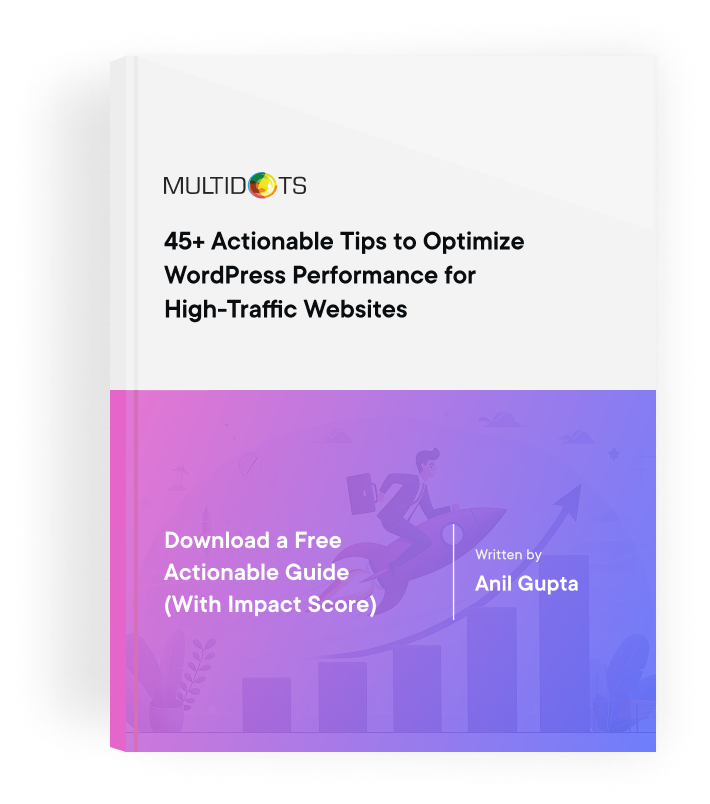Drupal vs WordPress: Which CMS Solution is Better for Your Enterprise?
Evaluate Drupal and WordPress to discover which CMS best meets your enterprise’s needs and scalability goals
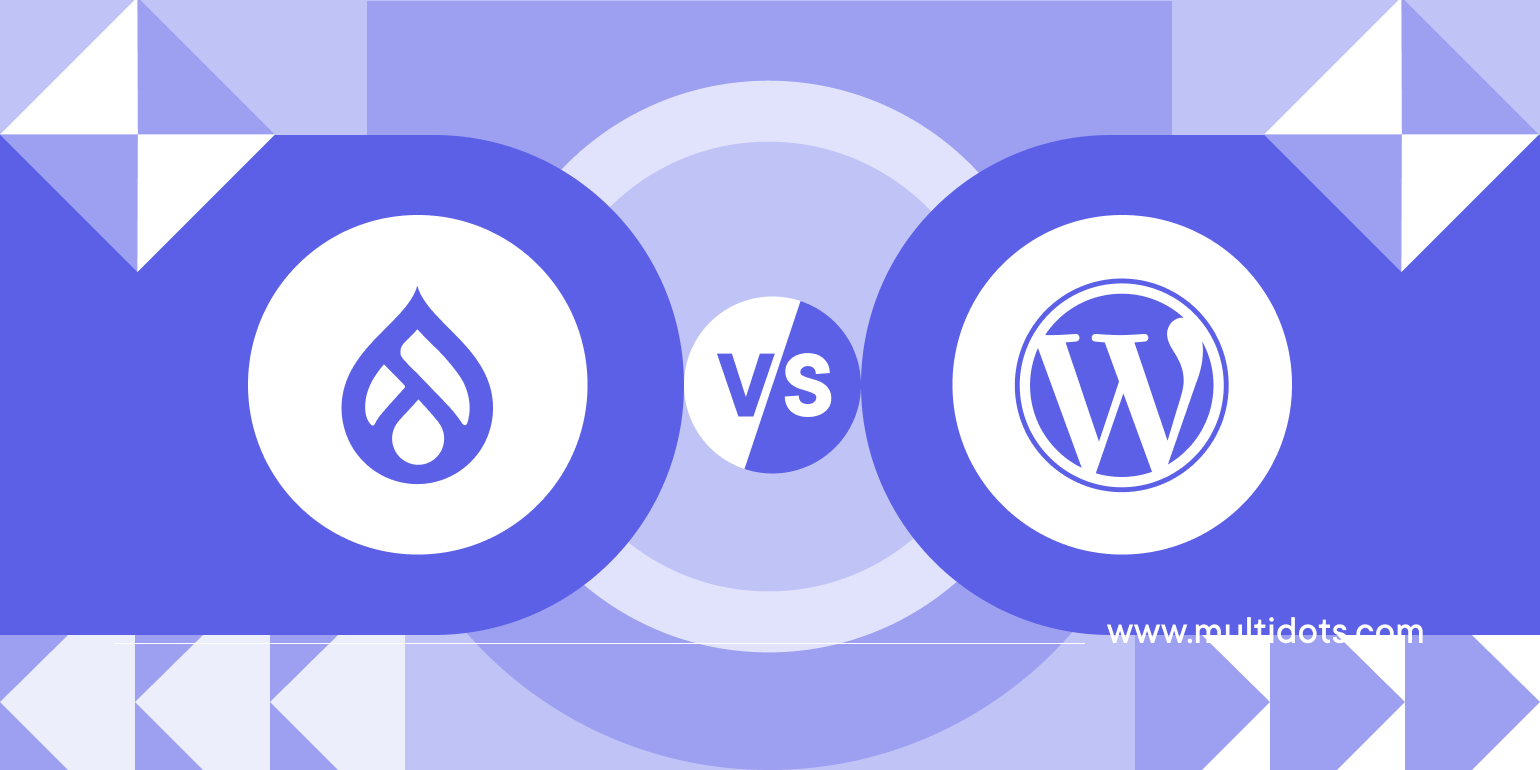
Table of Contents
Choosing the right Content Management System (CMS) is crucial for powering your enterprise website, as it affects everything from security and scalability to user experience and management.
WordPress, known for its user-friendly interface, is by far the world's most popular CMS. It caters to a broad audience, from small businesses to large enterprises, offering extensive customization through themes and plugins. On the other hand, Drupal is recognized for its robustness and flexibility, making it a strong contender for complex, large-scale projects and websites requiring detailed data organization.
Let's dive into how these two well-established CMS giants stack up against each other in this detailed guide on Drupal vs WordPress, and find the better match for your enterprise website.
What is Drupal?
Drupal is a powerful, open-source content management system (CMS) known for its developer-driven approach to building customizable, large-scale websites with intricate data organization needs.
Launched in 2001, Drupal has since come a long way. The latest iterations of Drupal (10 and 11) offer a host of advanced features and improvements in terms of its Layout Builder and CKEditor.
However, Drupal is known for its steep learning curve, which can make it less accessible for non-technical users compared to other CMS platforms. Additionally, while Drupal offers powerful customization capabilities, this can sometimes result in longer development times and higher costs for deploying large-scale websites.
What is WordPress?
Since its launch in 2003, WordPress has established itself as a stalwart in the CMS arena, renowned for its robustness and reliability. As an open-source platform, it boasts boundless flexibility and customization potential, free from the restrictions of a subscription model. WordPress is unmatched in scalability, adaptability, and extensive community support.
These features make it an ideal choice for everything from simple blogs to complex enterprise and eCommerce websites, continually evolving to meet the dynamic needs of its vast user base.
Drupal vs WordPress: Core Philosophy and Architecture
Drupal's core philosophy emphasizes flexibility and modularity. It is designed to be a highly customizable framework suitable for complex, content-heavy websites. Drupal's architecture is based on a system of modules that can be turned on or off to extend functionality, promoting a tailored approach to site building.
Drupal uses a hook-based architecture allowing modules to interact with the core functionality, which can be more complex but offers extensive flexibility for developers. It has strict coding standards that encourage consistency and best practices in development. Drupal’s API is extensive, offering detailed control over the system’s behaviors and interfaces, making it a good choice for complex integrations.
WordPress is built with usability and accessibility in mind, aiming to democratize publishing so that anyone can easily create and manage websites. Its design is centered around themes and plugins, which allow for extensive customization without needing to alter core code. WordPress too lays heavy emphasis on flexibility. It uses a hook system as well, but its architecture is generally considered more straightforward, focusing on themes and plugins for adding functionality.
WordPress also maintains coding standards, but with a focus on simplicity and backward compatibility, which may sometimes lead to less strict enforcement compared to Drupal. With the help of a WordPress development partner, complete control and customization is easily achievable on the WordPress CMS.
Drupal vs WordPress: What the Numbers Say
As of 2024, WordPress continues to dominate the content management system (CMS) market, being used by 43.5% of all websites on the internet. This represents 62.7% of all the websites whose CMS is known. The platform's growth has been consistent over the years, and it's particularly notable in the enterprise space, where WordPress powers 36% of the world's top 1 million websites by traffic.
Drupal, on the other hand, has seen a decrease in its market share. From 2022 to 2023, Drupal's market share declined from 2.0% to 1.6% among websites with known CMS. This represents a significant contrast to WordPress's expansive presence and growth trajectory.
Why Choose WordPress over Drupal?
These numbers highlight the significant difference in market penetration between WordPress and Drupal, and reflect the increasingly broader adoption and versatility of WordPress across various industries and website sizes.
Choosing WordPress over Drupal for enterprise websites often boils down to its superior user-friendliness, extensive plugin ecosystem, and global community support. WordPress makes it easy to manage and extend functionality without extensive technical know-how, allowing for ready adoption across various business functions in large organizations.
The Traits of an Ideal Enterprise CMS Platform
When selecting a CMS for enterprise-level operations, there are several critical traits to consider that ensure the platform can meet the rigorous demands of your large-scale online ops. These are:
Easy to Use: An ideal CMS should offer a straightforward, intuitive user interface that makes it easy for users of all skill levels to manage content. This ease of use helps reduce training time and allows for quicker updates to the website, essential for dynamic business environments.
Customizable and Flexible: The ability to customize and extend the CMS to meet specific business needs is crucial. This includes a wide range of plugins, themes, and development tools that allow you to tailor the CMS to your unique workflows and requirements.
Highly Secure: Security is paramount, especially for enterprises that handle sensitive customer data. The CMS must provide robust security features to protect against cyber threats and ensure data integrity. Regular security updates and active monitoring are also necessary to maintain a secure environment.
Superior Performance: Enterprise websites must load quickly and perform well under all conditions, especially high traffic. The CMS should be optimized for speed and efficiency, with advanced caching, streamlined code, and the ability to handle complex queries and data loads efficiently.
Scalable: As your business grows, your CMS must be able to scale accordingly. This means the platform should support increasing amounts of data, traffic, and transactions without degradation in performance. Scalability ensures that the CMS can grow with your company, avoiding costly migrations or overhauls down the line.
SEO and Marketing-Friendly: Building and maintaining a strong online visibility is crucial for enterprises. The CMS should have strong SEO capabilities, allowing for easy optimization of content, images, and other media. Marketing tools that integrate seamlessly with the CMS, such as social media plugins and email marketing automation tools, are also important for a holistic digital strategy.
Active Community and Support: A vibrant community and comprehensive support options can significantly enhance the CMS experience. These resources ensure that help is readily available when needed and that the CMS continues to evolve through community-driven enhancements and official updates.
These traits combine to make a CMS not just functional but a critical asset in the enterprise's digital strategy, facilitating growth and ensuring a robust online presence.
In the next sections, we’ll compare Drupal and WordPress head-to-head in all these aspects.
Drupal vs WordPress: A Category-Wise Comparison
When selecting a CMS for your enterprise, it’s essential to consider how each option fares in the critical aspects outlined above. Let’s assess them in more detail for Drupal and WordPress.
1. Ease of Use
When comparing the user interfaces of WordPress and Drupal, each serves its audience with distinct design philosophies that reflect their usability and target users.
WordPress is renowned for its clean and intuitive interface, which is one of its key selling points. It offers a straightforward dashboard and a simple Gutenberg block editor where users can easily navigate through options such as posts, pages, and settings. This accessibility makes WordPress an ideal choice for business users and non-developers who need a simple, effective tool to manage website content without a steep learning curve.
In fact, WordPress is designed to be user-friendly right from its initial set-up, allowing even the most non-technical of users to pick up the basics of content management very quickly. The platform is welcoming, with plenty of guides, tutorials, and an active community ready to help you navigate your first steps. The ease of use in WordPress extends to its more extensive plugin ecosystem, allowing you to easily add new functionalities without needing to write custom code.
On the other hand, Drupal presents a more robust and flexible interface that, while powerful, can be overwhelming for new users. Drupal’s administrative interface is not as immediately intuitive as WordPress and offers a complex system of menus that can perform a wide range of tasks. This complexity reflects Drupal's target audience of developers and technical administrators who require detailed control over their site's functionality.
The learning curve for new users is significantly steeper in Drupal compared to WordPress. New Drupal users often face a longer initial training period to become proficient in using its many features and capabilities. This is largely because Drupal is designed with a focus on customizability and complex data management, which necessitates a deeper understanding of its framework and underlying principles.
Overall, WordPress is often preferred by brands looking for an easy-to-use yet robust CMS that simplifies website management, while Drupal is suited for those who need a powerful system and have the technical skills to navigate its complexities.
2. Customization and Flexibility
When it comes to customization and flexibility, both WordPress and Drupal offer robust solutions tailored to different needs, largely facilitated through their respective ecosystems of plugins and modules.
WordPress, known for its user-friendly approach, extends its capabilities through plugins. There are over 59,000 plugins available in the official WordPress repository, covering everything from simple design tweaks to complex e-commerce solutions. As mentioned earlier, this plug-and-play approach empowers even non-technical users to tailor their sites to their specific needs, making WordPress incredibly flexible for a wide range of business use cases.
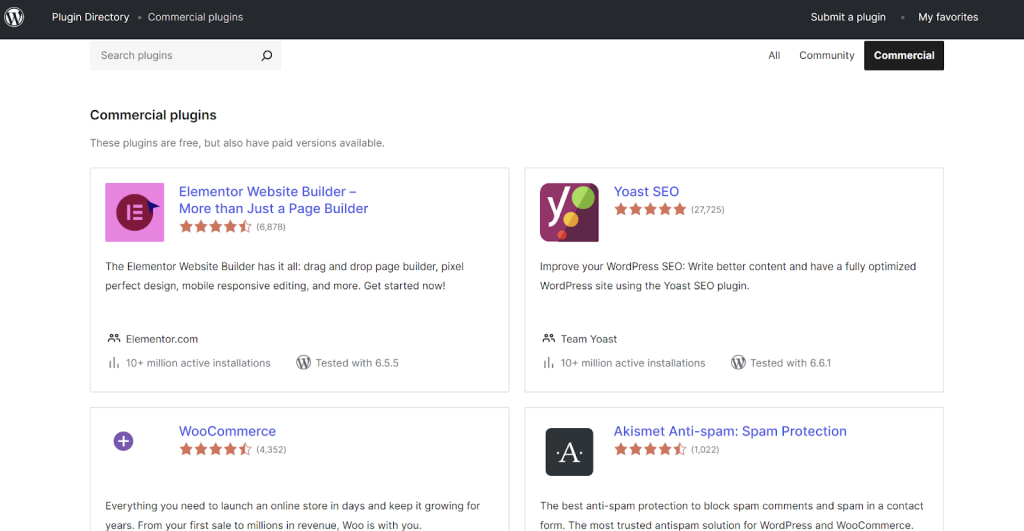
Drupal, on the other hand, offers modules for customization. There are fewer available modules (around 52,000) in Drupal. They are designed to deeply integrate with the core functionalities of the CMS, allowing for extensive customization and control over complex processes and data structures. This makes Drupal a good option for enterprise apps where complex data management and multi-layered access controls are necessary.
Enterprises can also benefit from Drupal’s baked-in capabilities in areas like advanced user and permission management, multilingual features, and intricate content workflow configurations. The ability to interact with multiple databases, extensive API support, and sophisticated caching mechanisms ensure that Drupal can serve enterprise needs at scale.
Overall, however, WordPress emerges as a superior choice for enterprise CMS due to its exceptional extensibility in all aspects. For instance, WordPress is better at supporting SEO (which we’ll elaborate on later) capabilities, detailed schema management, and programmatic SEO, making it highly effective for large-scale, multi-language sites. WordPress’s wider plugin ecosystem and adaptable architecture allow enterprises to tailor their sites efficiently while maintaining ease of use and scalability, making it the more practical and cost-effective solution for dynamic enterprise needs.
3. Modules and Plugins
Both Drupal and WordPress offer robust customization options through their extensive systems of modules and plugins, respectively. These tools enhance the functionality and versatility of websites, making each CMS adaptable to a wide range of needs.
Let’s take a look at the enterprise-relevant plugins and integrations in each.
WordPress Plugins
- Yoast SEO: Enhances search engine optimization, providing detailed content analysis and readability scores.
- WooCommerce: Transforms a site into a powerful e-commerce store with extensive features and customizable options.
- Elementor: A leading WordPress page builder that offers a drag-and-drop interface for designing and building web pages.
- Jetpack: Provides a suite of security, performance, and site management tools, including real-time backups and malware scanning.
- Advanced Custom Fields (ACF): Enables administrators to add custom fields and meta content across different types of content, enhancing data management and integration.
- WPML (WordPress Multilingual Plugin): Facilitates the building of multilingual sites, which is crucial for global enterprises looking to cater to diverse geographical markets.
- Admin Columns Pro: Improves admin panel management, allowing you to create powerful columns that sort, filter, and edit data on the fly, which is essential for managing large amounts of data efficiently.
- Gravity Forms: A powerful tool for creating advanced forms for lead capture, surveys, and user submissions. It supports a variety of integrations with other business tools.
- VaultPress: Offers real-time backup and security scanning to protect content and data integrity, vital for enterprise operations.
- MemberPress: Allows the creation of membership subscriptions, content access rules, and more, ideal for enterprises looking to offer premium content or build community platforms.
WordPress plugins like ACF and WPML emphasize enhancing site functionality and user experience on a global scale. They allow easy customization and content management, making WordPress highly adaptable and user-friendly, even in diverse and dynamic business environments.
Drupal Modules
- Views: Allows administrators to customize and display lists and tables of content.
- Webform: Enables the creation of forms and surveys.
- Pathauto: Automatically generates URL/path aliases for various types of content without requiring the user to manually specify the path alias.
- Commerce: A flexible e-commerce solution that leverages the extensive capabilities of Drupal for online stores.
- Panels: Offers sophisticated layout management capabilities to create customized pages with multiple regions and content blocks.
- Workbench: Provides editorial workflow management that includes creating drafts, managing moderation, and publishing permissions across multiple departments.
- Domain Access: Allows managing multiple affiliate sites from a single Drupal installation, ideal for complex corporate structures.
- LDAP Integration: Allows Drupal sites to communicate with LDAP (Lightweight Directory Access Protocol) servers for user authentication and data synchronization, essential for enterprises with existing directory systems.
- Features: Enables the packaging of configuration and content as features, facilitating the reuse of site features across multiple projects, which is crucial for maintaining consistency across an enterprise's digital properties.
- Memcache API and Integration: Improves site performance by integrating with Memcache to reduce database load, crucial for high-traffic enterprise sites.
In contrast, Drupal modules like Workbench and Domain Access are tailored for complex organizational needs, offering bespoke solutions that can significantly streamline enterprise operations. These modules cater specifically to scenarios involving intricate user permissions and workflows, which are common in large organizations.
The choice between Drupal vs WordPress will depend on specific enterprise needs — Drupal is a decent choice for those requiring a highly customizable system capable of handling complex data structures and workflows, but WordPress is better suited for enterprises prioritizing ease of use, quick deployment, and broad third-party integration.
4. Ownership Costs
Both WordPress and Drupal are free and open-source platforms. This means that neither of them requires a subscription fee or initial installation costs to get started.
That being said, the cost of owning and maintaining a website on Drupal compared to WordPress can vary significantly based on several factors, including the complexity of the site, the scale of operations, and the level of customization required.
Generally, WordPress is known for being cost-effective, especially for small to medium-sized enterprises. The core software is free, and many plugins and themes are available at no cost or for a nominal fee. However, costs can rise with the need for premium plugins and extensive custom development. Hosting costs for WordPress sites can vary widely, from shared hosting plans that are very economical to dedicated and managed hosting services that are more robust and expensive.
WordPress’s user-friendly nature and extensive community support mean that solutions to common problems are often readily available and less costly. Plus, WordPress developers — as there are more of them — are usually more affordable than Drupal developers.
On the other hand, Drupal is often more costly to maintain, primarily due to its complexity and the need for specialized skills. While the software itself is free, Drupal typically requires more custom development and expert configuration, which can lead to higher costs for developer services. Moreover, Drupal sites may demand more robust hosting solutions due to their complex nature and larger scale, potentially increasing hosting costs.
Development costs for Drupal are generally higher than for WordPress because Drupal’s architecture and customization capabilities require more technical expertise. The community behind Drupal is helpful, but it’s much smaller when compared to WordPress.
In summary, WordPress offers a more budget-friendly option in terms of both setup and ongoing maintenance for both SMEs and enterprises as compared to Drupal.
5. Hosting Options
In the previous section, we touched upon costs associated with hosting. So, what are the hosting options available in Drupal vs WordPress?
WordPress offers a range of hosting solutions from shared hosting for smaller sites to managed WordPress hosting services for enterprises. Big publishers often opt for managed WordPress hosting providers like WordPress VIP or WP Engine, which specialize in providing high-performance, secure, and scalable environments. These services include features like automatic updates, daily backups, and specific enhancements to speed up WordPress operations, crucial for maintaining the reliability and speed required by large-scale sites.
Specifically, WordPress VIP is a premium hosting service tailored specifically for high-traffic websites, large publishers, and enterprises. It offers an extensive array of features:
- Robust Security: WordPress VIP provides a highly secure environment with rigorous code reviews and automatic updates to safeguard against vulnerabilities.
- Scalability: Engineered for performance, WordPress VIP can handle massive spikes in traffic, making it ideal for major publishing operations.
- Enterprise Support: Businesses get access to expert support, including personalized assistance and advisory services to optimize their site performance and security.
WordPress VIP stands out by not only offering high-performance hosting but also integrating unique features tailored for media-rich enterprise sites:
- Content Delivery: Optimized for fast content delivery, WordPress VIP utilizes an advanced CDN to ensure quick load times globally.
- Automated Workflows: It supports DevOps practices with tools that streamline development workflows, making it easier to manage production, staging, and development environments.
WordPress VIP represents the pinnacle of WordPress hosting options, combining enterprise-grade security, scalability, and support to meet the needs of the most demanding sites.
Coming to Drupal, for enterprise websites and big publishers, its hosting options are often tailored to support complex, high-traffic environments. Drupal can be hosted on dedicated servers, managed hosting platforms, or cloud services like AWS, which provide scalable infrastructure and enhanced security features necessary for large-scale operations. These services often include performance optimization, automated backups, and advanced caching mechanisms to handle the significant content and user loads typical of enterprise sites.
Options include:
- Dedicated Hosting: Ideal for enterprises needing full control over their server environment, dedicated hosting provides the necessary resources without sharing them with other sites.
- Managed Hosting: Providers like Acquia and Pantheon offer Drupal-specific managed hosting solutions that include automated maintenance updates, security enhancements, and scalability options tailored for high-demand sites.
- Cloud Hosting: Services like Amazon Web Services (AWS) and Microsoft Azure allow for flexible and scalable hosting configurations that can dynamically adjust to traffic spikes and growing data needs. These platforms often include tools for load balancing, enhanced security, and automated backups, making them suitable for complex, high-availability Drupal sites.
Some advanced cloud hosting options further extend Drupal’s capabilities:
- Automated Scaling: Platforms like Acquia Cloud offer automated scaling features that adjust resources based on real-time demand, ensuring that the website remains stable and responsive even during unexpected surges in traffic.
- Enhanced Security: With enterprise-grade security measures, including regular security audits, automatic security updates, and threat detection, Drupal hosting providers ensure that enterprise sites are protected against the latest vulnerabilities.
Overall, both platforms support a variety of hosting options that can be customized to meet the specific needs of large enterprises and publishers, with a focus on security, scalability, and reliability. WordPress, in addition, allows for specialized features to cater to the unique demands of large organizations and big media platforms.
6. Security Features
When evaluating the security of CMS platforms, both WordPress and Drupal have robust measures in place, but their popularity and the ways they are used can affect their security profiles.
The WordPress platform itself is secure, but the vast ecosystem of plugins and themes can introduce vulnerabilities. WordPress core updates are frequent, addressing security issues as soon as they are discovered. However, most of the significant security incidents typically involve third-party plugins or themes rather than the WordPress core itself. WordPress's popularity necessitates users to incorporate proactive security practices, including regular updates, the use of security plugins, and strong password policies.
Drupal is considered highly secure, often used by government agencies and large organizations with strict security requirements. Its core is designed with advanced security in mind, offering extensive permissions and user access control mechanisms. However, like any platform, vulnerabilities do occur. Drupal’s security team is proactive in identifying and fixing issues, and they provide detailed security advisories to their users.
Both platforms have witnessed security incidents over the years. For instance, one notable incident involved a vulnerability in the WP GDPR Compliance plugin that affected over 100,000 WordPress sites in 2018. However, this was quickly addressed by a patch once identified.
Drupal has faced its challenges, too, such as the "Drupalgeddon" vulnerabilities (first in 2014 and again in 2018), which were critical vulnerabilities allowing attackers to exploit many sites. These incidents led to significant security overhauls and prompted the Drupal community to increase their focus on security even more.
Overall, both platforms are secure when properly maintained.
7. Performance and Scalability
When choosing a CMS for enterprise-level needs, performance and scalability are critical factors. Both WordPress and Drupal have been designed to handle large volumes of data and high traffic, but they do so with different architectural approaches and scalability features.
Known for its versatility, WordPress can effectively manage websites with high traffic and substantial data volumes when properly optimized. It achieves this through a combination of caching plugins, content delivery networks (CDN), and optimized hosting solutions. Large-scale sites often employ custom configurations and enhanced hosting environments (such as WordPress VIP) to ensure responsiveness under load.
Here at Multidots, we use WordPress for our website, and you can see the Core Web Vitals performance of our website below.
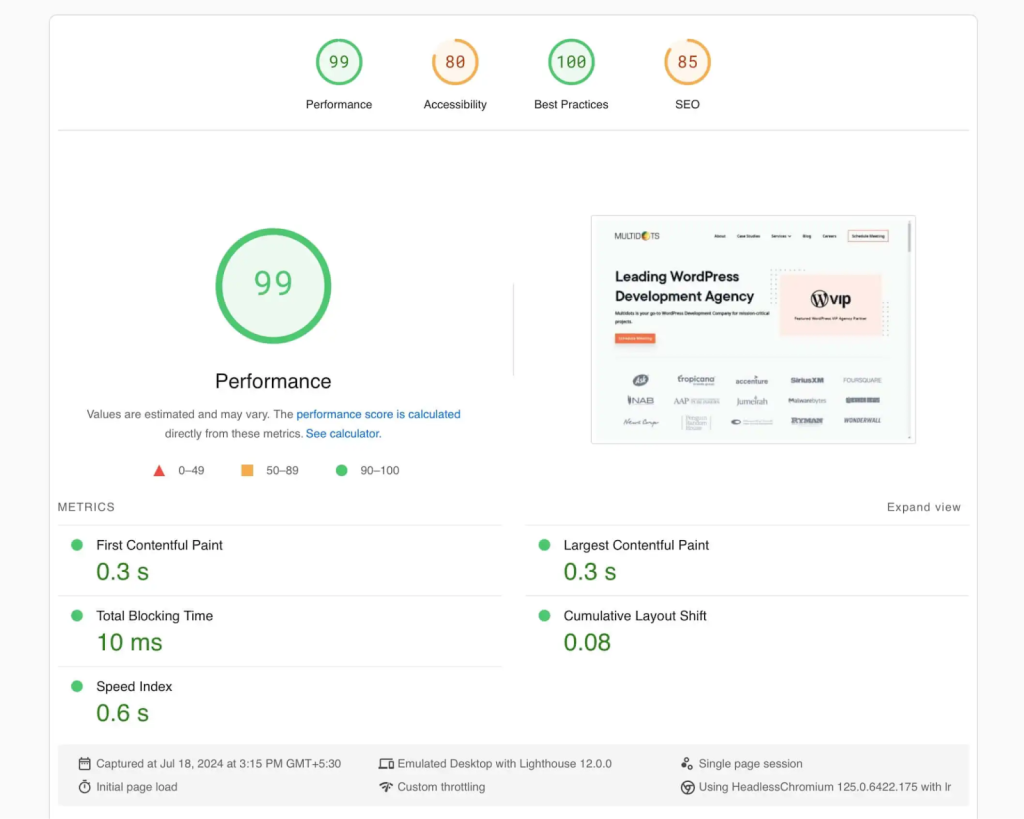
For example, major publishers like TechCrunch and CNN use WordPress to handle millions of monthly visitors, demonstrating its ability to scale. TechCrunch handles immense traffic spikes during major tech events, relying on WordPress’s flexible architecture and robust caching mechanisms to maintain performance.
Coming to Drupal, it does a great job at handling complex data structures and high traffic volumes, making it particularly suited for enterprise applications that require extensive data manipulation and multi-level access controls. Its built-in caching features, sophisticated database management, and scalability optimizations allow it to perform well under the stress of heavy use and large user bases.
Notably, websites like Weather.com and the University of Colorado have utilized Drupal's robust architecture to handle vast amounts of data and traffic with high efficiency. Drupal’s scalability is especially apparent in its handling of concurrent users and complex queries, which is a significant advantage for large organizations.
To sum up, both WordPress and Drupal offer strong performance and scalability options. Drupal provides more out-of-the-box features suitable for complex enterprise sites. But on the whole, WordPress emerges as a superior choice for performance and scalability, particularly when optimized with managed hosting solutions like WordPress VIP. Couple the right hosting with support from an expert WordPress agency like Multidots, and WordPress not only meets but exceeds the performance and scalability needs of large-scale enterprise websites.
8. SEO and Marketing Capabilities
WordPress and Drupal both offer robust SEO features, but they cater to different user experiences and expertise levels, influencing their approach to supporting marketing efforts.
WordPress, in particular, is renowned for its extensive SEO capabilities, primarily driven by its wide array of powerful plugins. One of the most popular SEO plugins is Yoast SEO, which provides comprehensive tools for optimizing meta tags, generating sitemaps, and improving readability, among others. WordPress also has a plethora of other plugins like All in One SEO Pack and Rank Math that offer similar functionalities, making it highly adaptable to various SEO needs.
The ease of integrating these plugins, coupled with WordPress’s user-friendly interface, makes it an excellent choice for marketers looking to implement SEO tactics without extensive technical expertise. Furthermore, WordPress’s structure naturally supports good SEO practices such as creating clean URLs, enabling breadcrumbs, optimizing for speed, and ensuring mobile responsiveness.
WordPress also shines in its ability to integrate with a myriad of marketing tools and platforms. Whether it’s email marketing, social media integration, website analytics, CRM, or lead generation tools, WordPress has a plugin that makes integration seamless. This ecosystem allows marketers to easily deploy a variety of strategies directly from the CMS.
On the other hand, Drupal offers robust SEO tools but requires a bit more technical know-how to fully leverage them. The SEO Checklist Module in Drupal provides users with a comprehensive list of SEO best practices and checks off completed tasks. Additionally, modules like Pathauto create URL patterns that are friendly for search engines and users alike, while Metatag allows detailed management of meta tags on a per-page basis.
Though Drupal does not have as many SEO plugin options as WordPress, its core features are SEO-friendly, with capabilities for customization and fine-tuning. This makes Drupal a good choice for more complex websites where control over every aspect of SEO is necessary, albeit harder for non-technical users to capitalize on properly.
Drupal, with its robust API capabilities, excels in creating a customized environment that can integrate well with other systems, like CRM software and marketing automation tools. This is ideal for businesses that require detailed tracking and personalized marketing campaigns, as it can be tailored extensively to meet specific marketing objectives.
Overall, both platforms support effective SEO and marketing, but the choice between Drupal vs WordPress can depend on your specific needs — WordPress for ease and breadth of use, and Drupal for more customizability.
9. Support and Community
The strength of a CMS often extends beyond its software capabilities to the community and support framework that surrounds it. Both WordPress and Drupal excel in these areas, though their approaches and resources available vary.
WordPress offers many support channels, from official forums and detailed documentation to various third-party sites offering tutorials and tips. The WordPress support ecosystem is bolstered by a massive global community, which contributes to an extensive repository of information on nearly every aspect of using the platform.
In fact, the WordPress community is one of its greatest assets. With thousands of developers contributing to its core, themes, and plugins, there is a continuous improvement and expansion of its capabilities.
WordPress also hosts numerous WordCamps worldwide — community-organized events that bring users and developers together to learn and collaborate. This extensive community engagement helps ensure that users of all skill levels have access to the resources they need to succeed with WordPress.
Drupal’s support infrastructure is robust too, featuring detailed official documentation, community forums, and mailing lists where developers can get help from other experienced users and developers. Drupal also offers a problem-solving resource through its issue queues on the Drupal website, where users can report and discuss bugs and find fixes.
Though significantly smaller in size than WordPress — owing to its lower market share — Drupal has a strong professional community known for its dedication to the platform’s success and evolution. The community contributes to the project by developing modules, creating distributions, and providing support and education through DrupalCon, meetups, and training sessions.
So, both WordPress and Drupal boast vibrant, active communities and comprehensive support systems that are crucial for users ranging from beginners to advanced developers. Each platform’s community not only supports troubleshooting and development but also drives the platforms forward, ensuring they remain relevant and effective in the fast-evolving landscape of web technology. Strictly speaking in terms of numbers, however, WordPress is the clear winner.
Drupal vs WordPress: What the Future Holds
As CMS technologies evolve, both Drupal and WordPress are expected to introduce significant updates to adapt to the changing digital landscape.
Future updates in Drupal are likely to focus on enhancing API-first architecture, making it even more robust for headless CMS applications where Drupal acts as a backend serving data to various frontends like mobile apps and IoT devices. You can also expect continued improvements in Drupal's multilingual capabilities and accessibility compliance.
WordPress is expected to further enhance its Gutenberg editor, making it more intuitive and feature-rich for users. Efforts to improve the WordPress REST API will continue, allowing better integration with modern JavaScript frameworks. WordPress will likely invest in full-site editing capabilities, pushing towards a more seamless editing experience across entire websites.
Both platforms are also expected to double down on security enhancements and performance optimizations to handle more complex use cases and larger datasets more efficiently. These updates will ensure that both Drupal and WordPress remain competitive and capable of handling future web development needs.
How WordPress Wins: A Quick Case Study
As you’ve probably realized by now, WordPress surpasses Drupal for enterprise CMS needs due to its user-friendly interface, extensive plugin ecosystem, and stronger community support, making it ideal for large websites seeking an adaptable and scalable CMS platform.
Many enterprises consider migrating to WordPress to leverage these advantages for enhanced operational efficiency and user experience, while also cutting ongoing maintenance costs.
A prime example of WordPress's capability in action is our case study of NAB Show. NAB Show, the world's largest broadcasters' trade show, needed a platform that could handle high traffic volumes and streamline content management. We helped them in their migration from Drupal to WordPress, and significantly improved their website's performance, cutting down page load times by a whopping 77.51% and launching the site three months ahead of schedule. This migration not only enhanced the site's efficiency but also maintained its high SEO rankings during a critical period.
If you’re an enterprise contemplating a similar transition, partnering with an experienced WordPress agency like Multidots can ensure a smooth and successful migration from Drupal to WordPress.
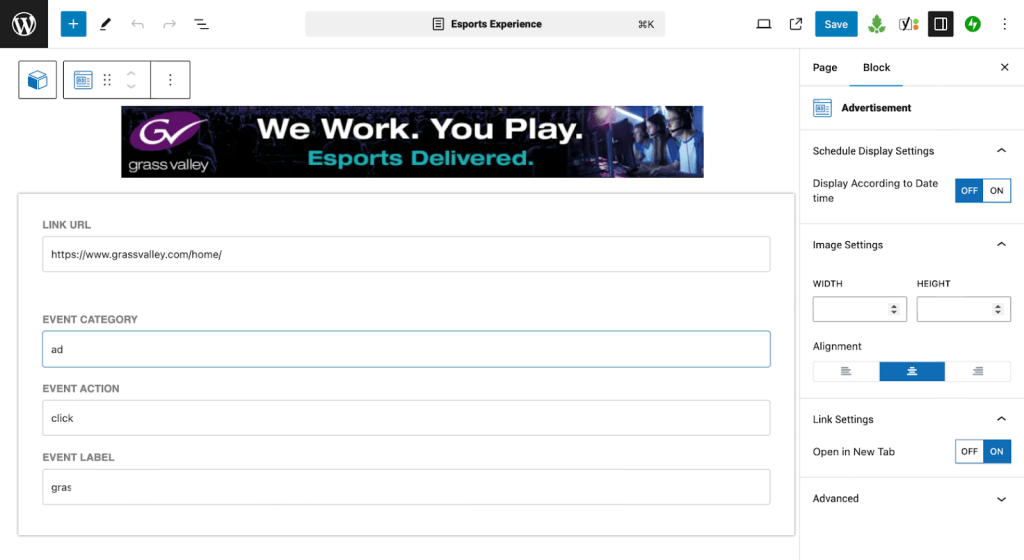
Drupal vs WordPress: The Verdict
Choosing between WordPress vs Drupal can make all the difference in how well your brand connects with its audience in terms of the UX, organic search visibility, and more.
At the end of the day, Drupal, despite being a robust CMS, is a bit of a technical mess. Ultimately, you’re stuck with confusing documentation, a steep learning curve, fewer module options, slower user adoption rates, and an overall higher cost of running your website.
Whereas WordPress shines with its intuitive interface, superior plugin ecosystem, and global developer community, making it ideal for large enterprises looking to scale fast.
To conclude, if you’re seeking a CMS that balances ease of use with powerful capabilities, WordPress is the recommended choice. Its flexibility and performance prowess cater well to evolving business needs.
If you’re already using Drupal and looking to migrate from Drupal to WordPress, partnering with an experienced enterprise-only WordPress agency like Multidots can smoothen the process, ensuring your business leverages WordPress's strengths with minimal disruption.
Get in touch with us to learn more.
Drupal vs WordPress: FAQs
-
While Drupal was traditionally favored for its robust architecture ideal for complex, large-scale sites, WordPress is increasingly recognized as a stronger contender for enterprise websites. Its scalability, enhanced by a vast array of plugins and themes, coupled with enterprise-level hosting options, makes WordPress a highly capable and versatile choice for businesses of all sizes. Additionally, its ease of use ensures faster adoption across organizational teams.
-
WordPress is generally easier for beginners due to its intuitive user interface and a vast array of resources for new users, making it more accessible than Drupal.
-
WordPress has a larger selection of plugins compared to Drupal’s modules, offering a wide variety of options for extending functionality easily. Drupal modules, while fewer, tend to be more robust and integrated.
-
Both platforms offer strong multilingual support, but Drupal’s core multilingual features are particularly powerful and flexible, making it slightly better suited for complex multilingual sites.
-
Setting up a Drupal site typically involves higher costs due to its need for more specialized development expertise. WordPress can be less expensive to set up due to its user-friendly nature and abundance of themes and plugins that streamline the process.
Feel free to schedule a quick call with our migration expert.
Contact Us